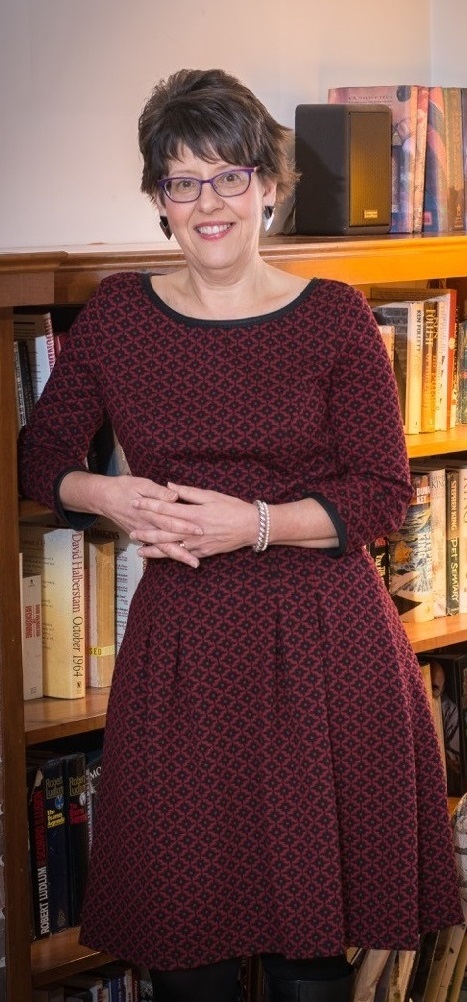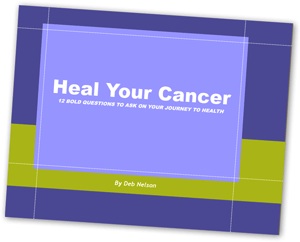When you first hear the news that you have cancer, it’s like being punched in the gut. Your brain is instantaneously filled with a million questions, but you’re so dumbfounded that, even if they made sense, you couldn’t get them out. The best you can do is ask, “I have cancer? Are you sure?”
Deb Nelson, who is a storyteller, has never been diagnosed with cancer. And yet, she written an eBook designed to help people who do have cancer navigate their way.
She says it all started when she was training for a triathlon to raise funds in support of Maine cancer patients and their families. “I read Brendan Brazier’s book Thrive: The Vegan Nutrition Guide to Optimal Performance in Sports and Life,” Deb explains. “One simple phrase in that book changed my life: ‘It is impossible for cancer to develop in an alkaline environment.”’
She began researching the relationship between cancer and an alkaline diet (a theory based on lab studies that suggest cancer cells thrive in an acidic (low pH) environment, but cannot survive in alkaline (high pH) surroundings.) She talked to people who were currently being treated for cancer and people who had been proclaimed cancer-free. She attended conferences to learn about the relationship surrounding nutrition, lifestyle, and cancer.
One result of Deb’s three-year long quest is a list of questions that she would ask if she were ever diagnosed with cancer. And because she’s a writer, she decided to turn those questions into an eBook: Heal Your Cancer: 12 Bold Questions to Ask on Your Journey to Health.
“Cancer’s a pretty big life event,” she says, “and everyone who is diagnosed with cancer is faced with making big decisions. This e-Book will introduce 12 BOLD questions to help you make those big decisions – by no means an exhaustive list of questions you’ll want and need to ask.”
Deb’s twelve bold steps
When you read Deb’s eBook, you will get more than a list of her 12 questions. She dives into each of them and offers additional advice. A disclaimer at the beginning clearly states that, “This book is written as a source of information only. The author is not a doctor and has no medical training.”
You don’t need a medical degree to ask the right questions about your cancer diagnosis and treatment. But you might need an advocate who can give you some guidance on how to get the conversation started with not only your healthcare team, but also your family and friends.
These are the questions Deb suggests to help you start your conversation:
- Can you help me?
This question is first because you’re going to need some help. Asking for and receiving help are great gifts that will let you pay attention to getting your health back. - What is my diagnosis?
This might sound silly – of course you’re going to get your diagnosis. You’d be surprised to learn, though, that many people don’t have the exact name of their cancer, or the stage of their cancer, recorded. - What does success look like?
The answer to this question will let you know if your team shares your goals and understands what you want your future to look like. - What does that mean?
Cancer is serious business. You want to make sure you understand everything your team is telling you about your health.
- What can I do?
Asking this question will give you some information about your doctor’s approach to treatment. You will also be declaring your intention to take an active role in your health team – no victim here, you’re not sitting on the sidelines. You’re ready to take control of your health. - Who should be on my healthcare team?
There are a variety of healthcare professionals you might want to bring into the conversation. - Where can I get more information?
Your team of experts has behind-the-scenes access to a variety of services you might want to investigate. - How do you know this will help me?
When your team suggests a treatment, ask how they know it’s the right thing for you to do. - Are you building up my immune system or attacking cancer cells directly?
Are you and your team on the same page with the best approach to managing and healing your cancer? - What are the side effects and complications?
You’ll want to ask this question as you discuss every drug / therapy / procedure you talk about with your medical team. - What if I do nothing?
To be clear, “nothing” means opting out of conventional treatment – surgery, chemotherapy, radiation – at least initially. - How will we track my progress?
Once your treatment plan is underway, you’ll want to monitor progress.
If you’d like your own copy of Deb’s eBook, you can download it for free on her website: Heal Your Cancer: 12 Bold Questions to Ask on Your Journey to Health.
If you have been diagnosed with cancer, are there any questions you think should be added to Deb’s list?



Leave A Comment